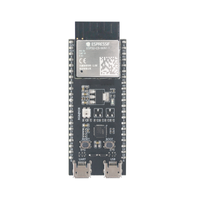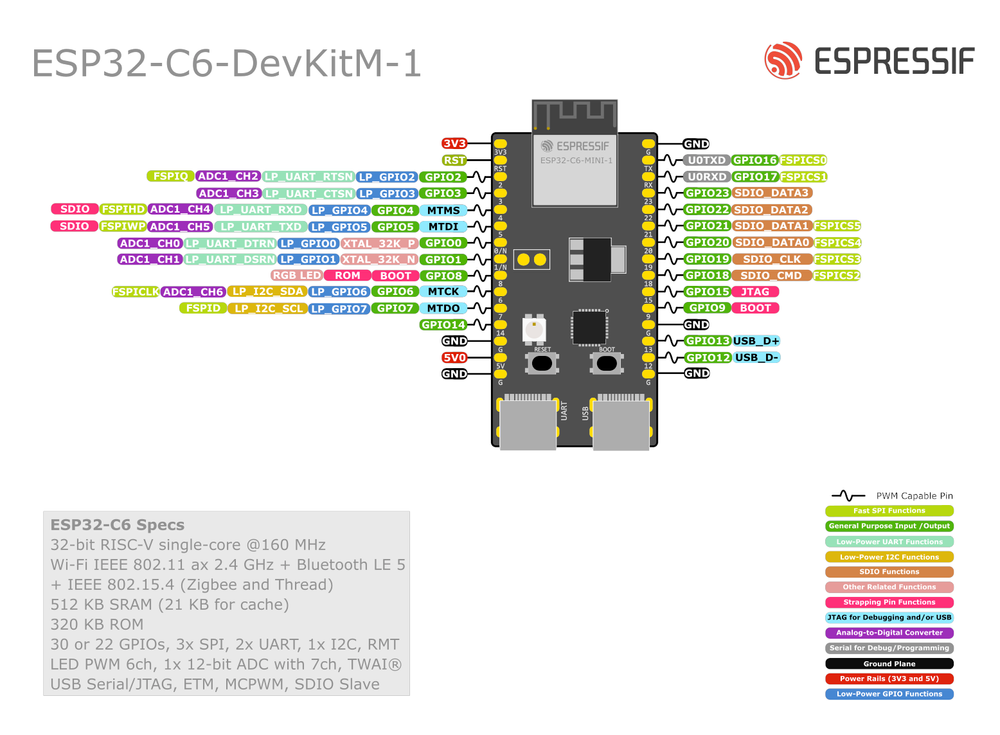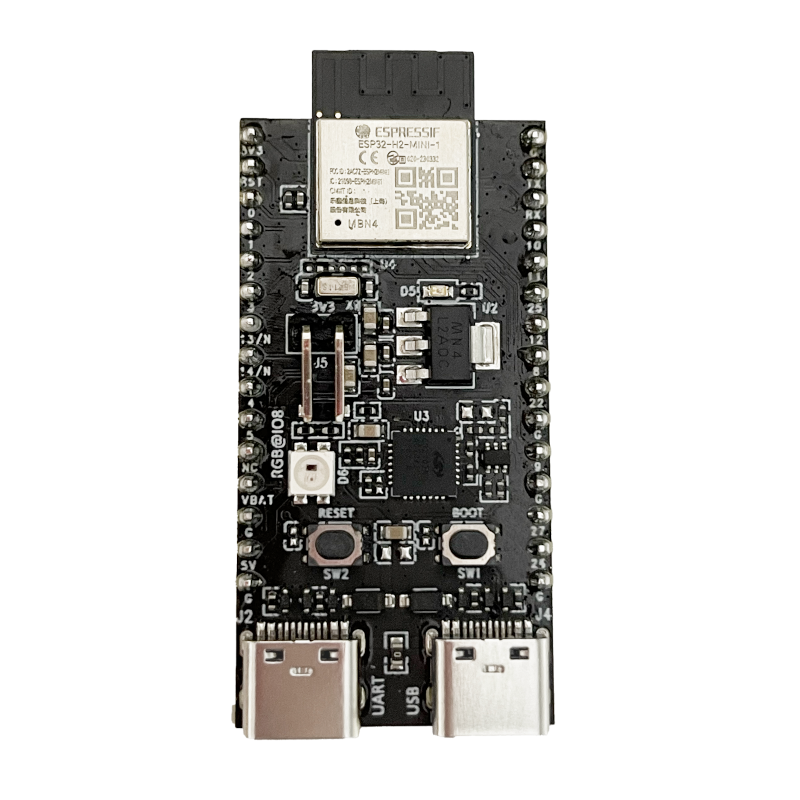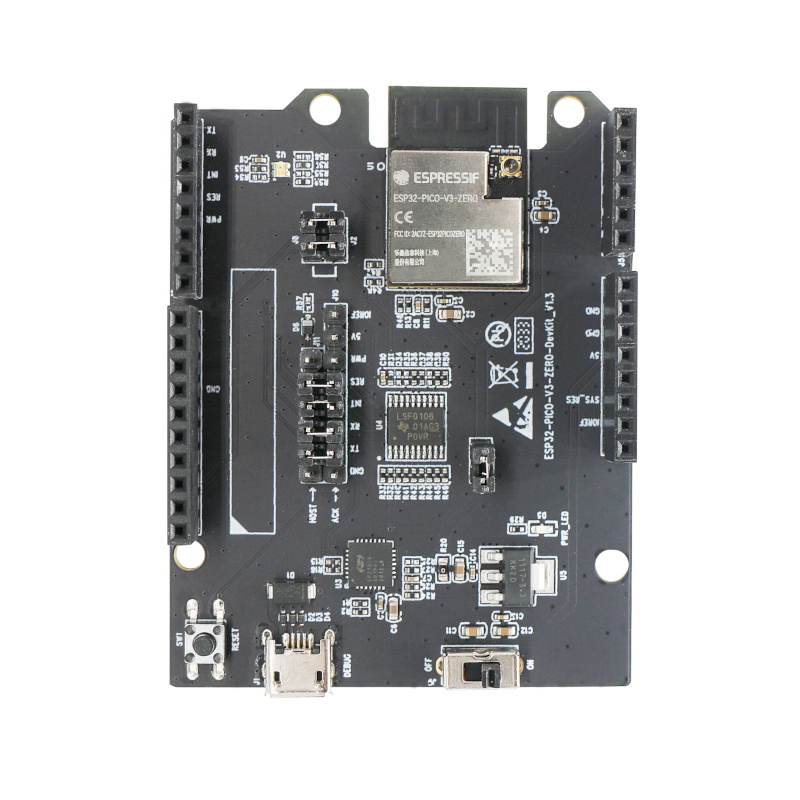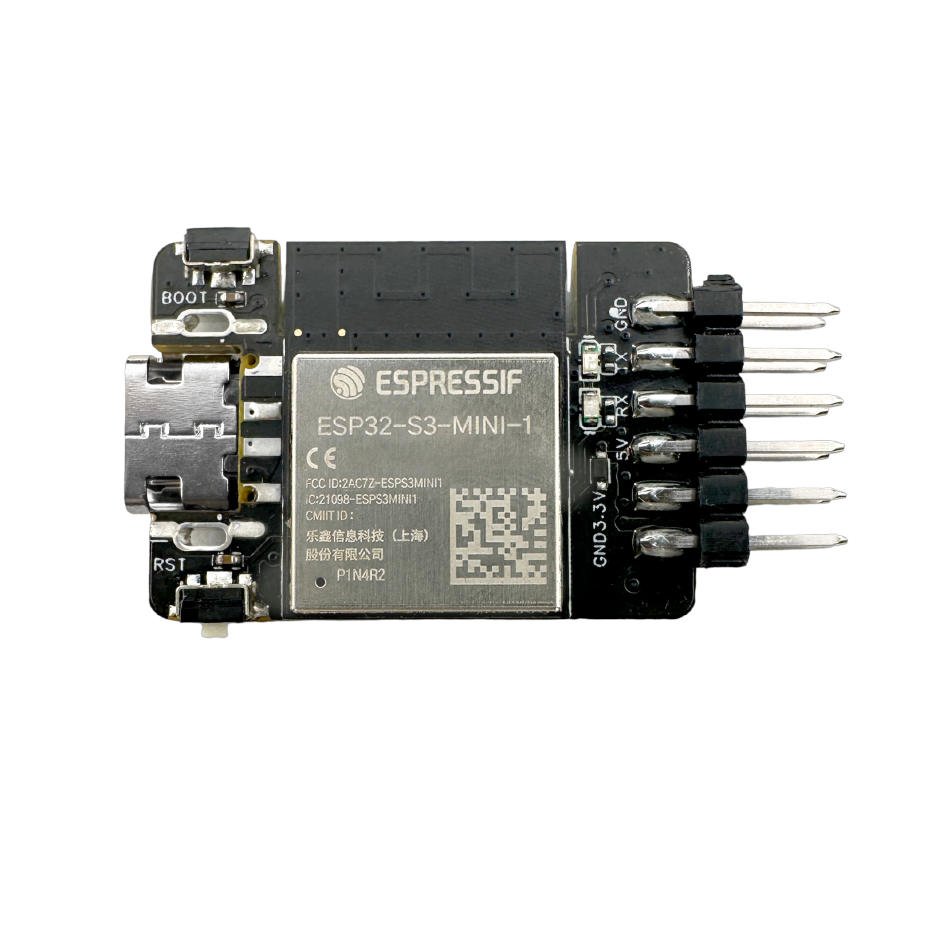Espressif ESP32-C6-DevKitM-1 Development Board
Code name: ESP32_C6_DEVKITM_1
Espressif ESP32-C6-DevKitM-1 development board is based on esp32c6 microcontroller and uses riscv architecture. This board has a maximum CPU frequency of 160 MHz and a flash size of 4MB.
About Espressif ESP32-C6-DevKitM-1
The ESP32-C6-DevKitM-1 is an entry-level development board based on the ESP32-C6-MINI-1(U) module, which includes a 4 MB SPI flash. This board integrates complete Wi-Fi 6, Bluetooth LE 5.0, Zigbee 3.0, and Thread 1.3 functionalities, making it ideal for IoT applications. Most of the I/O pins are broken out to the pin headers on both sides for easy interfacing, allowing developers to connect peripherals with jumper wires or mount the board on a breadboard.
Where to Buy


Prices are subject to change. We earn from qualifying purchases as an Amazon Associate.
Technical Specifications
🛰️ Connectivity
🧠 Microcontroller
✨ Features
- 22 digital IO pins
- 16 external interrupt pins
- 6 analog input pins
- 6 PWM pins
Espressif ESP32-C6-DevKitM-1 Pinout
✅ Safe Pins to Use
For general GPIO usage, these are the safest and most flexible choices:
Why Are These Pins Safe?
- Not involved in bootstrapping → No impact on device boot mode or system startup
- Not linked to flash memory or PSRAM → Won't interfere with storage or memory access
- Not dedicated to USB or JTAG → Free for general use without affecting debugging
- No special hardware connections → Freely assignable without internal conflicts
⚠️ Pins to Avoid or Use with Caution
Some pins are reserved for critical functions like bootstrapping, JTAG debugging, USB communication, and flash memory operations. Misusing these pins may lead to boot failures, programming issues, USB conflicts, or disruptions in flash storage.
Critical Pin Categories:
- 🛠️ Strapping Pins: Control boot behavior and flash voltage selection
- 🔗 JTAG Debugging Pins: Required for low-level debugging
- 🔌 USB Communication Pins: Used for USB Serial/JTAG communication
- ⚡ Flash Memory & SPI Pins: Connected to SPI flash memory and PSRAM
- 📡 UART Serial Communication Pins: Used for debugging and firmware uploads
| PIN | Label | Reason | Function |
|---|---|---|---|
| IO4 | MTMS | Used during boot; required for JTAG debugging; flash data in internal-flash models. | 🛠️ Strapping |
| IO5 | MTDI | Used during boot; required for JTAG debugging; flash data in internal-flash models. | 🛠️ Strapping |
| IO6 | MTCK | Required for JTAG debugging; connected to flash clock in internal-flash models. | 🔗 JTAG |
| IO7 | MTDO | Required for JTAG debugging; connected to flash data in internal-flash models. | 🔗 JTAG |
| IO8 | GPIO8 | Determines boot mode; pulling low at reset can prevent normal boot. | 🛠️ Strapping |
Espressif ESP32-C6-DevKitM-1 Pin Mappings
This development board provides 22 digital IO pins, out of which 16 can be used as external interrupt pins , 6 as analog input pins and 6 pins have Pulse-Width Modulation (PWM) .
| Pin | Function | ESP Pin | Input/Output | Description |
|---|---|---|---|---|
| 1 | 5V | 5V | POWER INPUT | 5V power input for the board |
| 2 | GND | GND | POWER GROUND | Ground connection |
| 3 | 3V3 | 3.3V | POWER OUTPUT | 3.3V power output for peripherals |
| 4 | TX | TX | TX | TX |
| 5 | RX | RX | RX | RX |
| 6 | IO0 | GP0 | BIDIRECTIONAL | GPIO, ADC pin |
| 7 | IO1 | GP1 | BIDIRECTIONAL | GPIO, ADC pin |
| 8 | IO2 | GP2 | BIDIRECTIONAL | GPIO, ADC pin |
| 9 | IO3 | GP3 | BIDIRECTIONAL | GPIO, ADC pin |
| 10 | IO4 | GP4 | BIDIRECTIONAL | GPIO, ADC pin |
| 11 | IO5 | GP5 | BIDIRECTIONAL | GPIO, ADC pin |
| 12 | IO6 | GP6 | BIDIRECTIONAL | GPIO, ADC pin |
| 13 | IO7 | GP7 | BIDIRECTIONAL | GPIO |
| 14 | IO8 | GP8 | BIDIRECTIONAL | GPIO, RGB LED, BOOT, ROM |
| 15 | IO9 | GP9 | BIDIRECTIONAL | GPIO, BOOT |
| 18 | IO12 | GP12 | BIDIRECTIONAL | GPIO, USB_D- |
| 19 | IO13 | GP13 | BIDIRECTIONAL | GPIO, USB_D+ |
| 20 | IO14 | GP14 | BIDIRECTIONAL | GPIO |
| 21 | IO15 | GP15 | BIDIRECTIONAL | GPIO, JTAG |
| 22 | IO16 | GP16 | BIDIRECTIONAL | GPIO |
| 23 | IO17 | GP17 | BIDIRECTIONAL | GPIO |
| 24 | IO18 | GP18 | BIDIRECTIONAL | GPIO |
| 25 | IO19 | GP19 | BIDIRECTIONAL | GPIO |
| 26 | IO20 | GP20 | BIDIRECTIONAL | GPIO |
| 27 | IO21 | GP21 | BIDIRECTIONAL | GPIO |
| 28 | IO22 | GP22 | BIDIRECTIONAL | GPIO |
| 29 | IO23 | GP23 | BIDIRECTIONAL | GPIO |
Espressif ESP32-C6-DevKitM-1 Pins Mapping Arduino IDE
Below you can find the Espressif ESP32-C6-DevKitM-1 pinout. This development board provides 22 digital IO pins, out of which 16 can be used as external interrupt pins, 6 as analog input pins and 6 pins have Pulse-Width Modulation (PWM).
| Pin | Analog | Touch | PWM | Other |
|---|---|---|---|---|
| 0 | A0 | T0 | PWM | |
| 1 | A1 | T1 | PWM | |
| 2 | A2 | T2 | PWM | |
| 3 | A3 | T3 | PWM | |
| 4 | A4 | T4 | PWM | |
| 5 | PWM | |||
| 6 | PWM | |||
| 7 | PWM | |||
| 8 | PWM | |||
| 9 | PWM | |||
| 10 | PWM | |||
| 11 | PWM | |||
| 12 | PWM | |||
| 13 | PWM | |||
| 14 | PWM | |||
| 15 | PWM | |||
| 16 | PWM | |||
| 17 | PWM | |||
| 18 | PWM | |||
| 19 | PWM | |||
| 20 | PWM | |||
| 21 | PWM |
Default Tools
| Bootloader tool | esptool_py |
| Uploader tool | esptool_py |
| Network uploader tool | esp_ota |
| Bootloader address | 0x1000 |
| Flash mode | dio |
| Boot mode | dio |
| Maximum upload size | 2048 Kb (2097152 B) |
| Maximum data size | 320 Kb (327680 B) |
The Espressif ESP32-C6-DevKitM-1 development board by default uses esptool_py uploader tool, esp_ota network uploader tool for Over-the-air (OTA) uploads and esptool_py bootloader tool. The bootloader starts at address "0x1000". Flash mode and boot mode for Espressif ESP32-C6-DevKitM-1 development board by default is dio and dio respectively.
